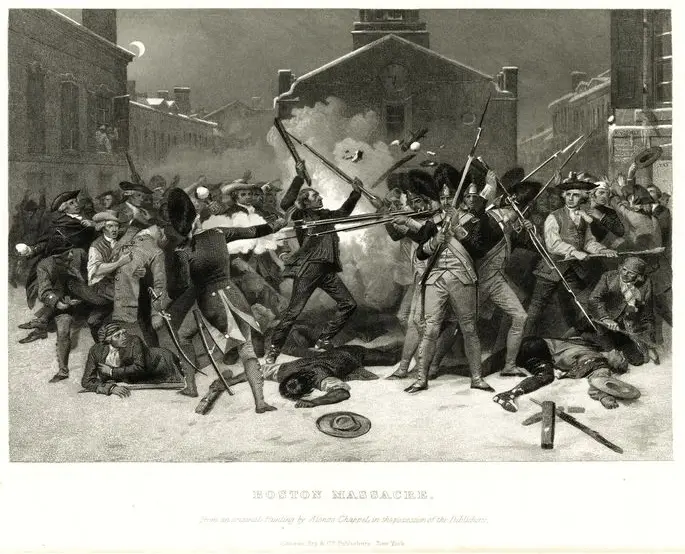After the Boston Massacre
The Boston Massacre resulted in the death of five colonists by British soldiers. This was the first action of such extreme violence taken by the British, and the colonists were angry. The British soldiers and one officer involved was put in jail; however, since they were in Boston, it was doubtful that they could get a fair trial.
- Captain Thomas Preston was the officer in charge of the British soldiers involved in the Boston Massacre, and he had also been present during the shooting. He was arrested along with the other soldiers, and it took seven months for all of the British involved to be arraigned.
- Seeking a fair trial was difficult as they couldn’t find an attorney for the British soldiers and Captain Preston. At the time, John Adams was a lawyer, but he was also an American patriot. His belief in the law and a fair trial made him step up and volunteer to be the attorney for the soldiers and Preston.
- Adams received many complaints from the colonists, and they were angry at him for acting as the attorney for what they perceived as “the enemy.” Adams persisted because he felt everyone deserves a fair trial.

- John Adams knew that the death penalty was one of the punishments if the men were found guilty, and the attitude of the colonists was already intense against the British. John Adams knew that having a trial in Boston would not be wise, so he convinced a judge only to allow jurors that were from outside of Boston.
- Almost the entire population of Boston attended the funerals of those that had been shot and died. Samuel Adams created a committee that worked with the colonists to investigate what had happened. When a town meeting was held, the colonists required that the British troops leave their area.
- In court for Preston’s trial, John Adams made clear that many of the statements from the eyewitnesses were conflicting and that it had been at night. There were some that said that Preston had ordered his men to fire and other colonists that said that he hadn’t. The argument that Adams presented was that there was reasonable doubt, and Captain Preston was found not guilty.
- The British soldiers were claiming self-defense and were all found not guilty of murder. However, two of them were found guilty of manslaughter. The English Law for punishment at the time was to have their thumbs branded as first offenders.
- The impact of the Boston Massacre was carried throughout the colonies. The colonists were already angry at the British for the heavy taxes they had imposed, and they were protesting in every way that they could.
- Anti-British organizations such as the Sons of Liberty had been formed, and the Boston Massacre was yet another reason for the colonists to want freedom from British rule.
- Captain Preston later wrote: “None of them was a hero. The victims were troublemakers who got more than they deserved. The soldiers were professionals…who shouldn’t have panicked. The whole thing shouldn’t have happened.”
- The tension and anger against the British by the colonists continued to get worse. Within five years, the colonists took rebellious actions, including the Boston Tea Party, where they threw the British tea overboard in protest. The colonists also formed the First Continental Congress as well as took arms at Concord to defend their militia arsenal against the British.
- It’s believed that the Boston Massacre was the first action that sparked what would become the American Revolution against the British to become an independent nation.
Q&A:
What was the result of the town hall conducted by the colonists after the Boston Massacre?
They required that the British troops leave the area
What did John Adams request of the judge for the trial of the British soldiers and Captain?
That the jurors be from outside of the Boston area
What defense did John Adams use for Captain Preston?
The conflicted statements of the witnesses
What did the British soldiers plea at their trial?
Self-defense
The Boston Massacre prompted what famous action of protest against the British?
Boston Tea Party
Why did John Adams choose to be the lawyer for the British soldiers and Captain Preston?
He felt they deserved a fair trial



